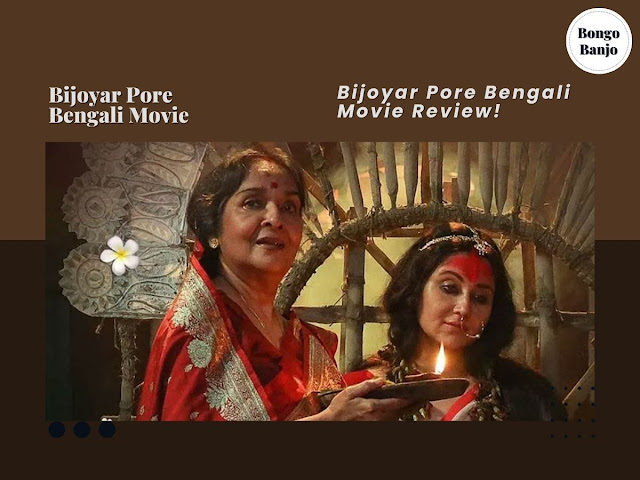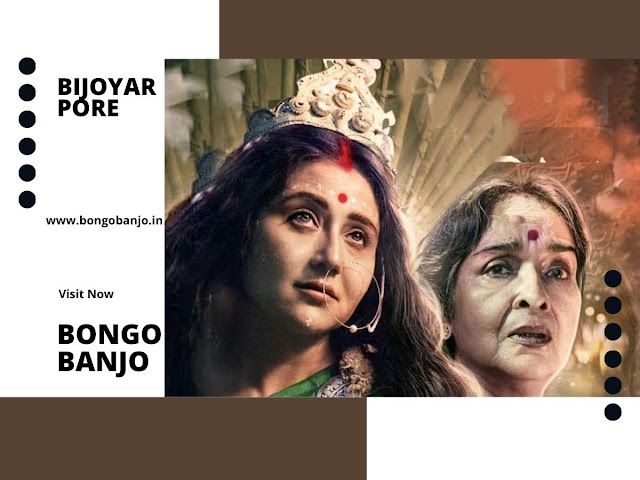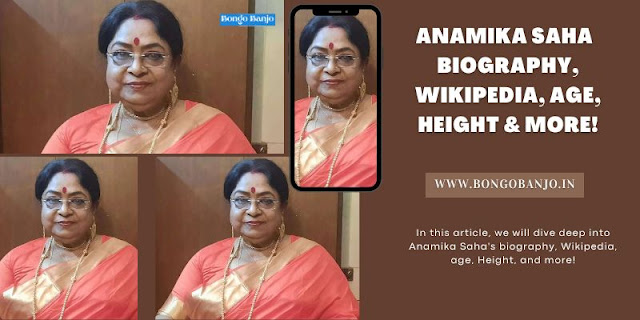Bijoyar Pore Bengali Movie Review!
Bijoyar Pore is a Bengali film exploring the loneliness and sorrow of an elderly couple, directed by debutant Avijit Shridas.
This movie review discusses the strengths and weaknesses of the script, acting, direction and music.
While there were some genuine attempts to capture the struggles of old age, continuity errors, lack of plausible character motivations and unimpactful performances prevent the film from truly touching the heart.
Overall, it is a commendable effort but lacks finesse due to directorial inexperience.
- Movie – Bijoyar Pore
- Cast – Mamata Shankar, Swastika Mukherjee, Deepankar De, Mir Afsar Ali, Mishka Halim, Bidipta Chakraborty, Ritabrat Mukherjee, Kheya Chattopadhyay and others.
- Direction – Avijit Shridas
Could the film 'Bijoyar Pore' by director Swastika Mukherjee-Mamata Shankar touch the heart saddened by the loneliness of Sindhu?
The debutant director has scripted the story and narrative of a couple distressed by self-infliction.
In the present times, old age is a big disease. Especially if the children and grandchildren are not around, then the condition of the old parents becomes very pitiful.
When they fall ill it’s still somewhat bearable, but even otherwise the agony of loneliness pierces deeper into the heart.
Life without loved ones becomes unbearable. On top of that, pride sets in. The unspoken, unuttered pain that they cannot share with anyone puts even more pressure on the heart.
It is the story and narrative of such a couple distressed by self-infliction that director Avijit Shridas has crafted in 'Bijoyar Pore'.
Although there is nothing particularly novel in terms of subject matter, Avijit has tried to capture the pain of loneliness of the elderly couple.
How many in today’s Bengali cinema do that? In that sense, ‘Bijoyar Pore’ is undoubtedly a commendable effort.
It would have been even more praiseworthy if more attention was given to the script and direction.
There is almost none of that. It’s fine until the point where the annual Durga Puja takes place in the large house of the elderly couple, when their overseas or distant children-daughter-in-law, grandchildren come to visit Dada-Dadi – up until here it makes sense.
But it becomes problematic when it is not shown who is making arrangements for the puja in such a big house. When the owner of the house falls ill, who takes care of him?
The film starts on a good note on the morning of Mahalaya with a reading of Mahishasurmardini! Very good.
But then who is doing the rest of the puja work? How come the lady of the house already had sindoor (vermillion) on her face in the morning of Dashami after apparently taking care of the puja preparations, when the ritual of sindoor khela happens in the afternoon before the Bisarjan?
She somehow managed to take care of her children single-handedly the whole day with that smeared sindoor face! Is there no one else in the house?
The grandson who said he would come home the next morning after starting on the day of the puja itself, came in the evening of Dashami!
Did none of the other relatives come during the four days of Pujo? Had they all only come for Bijoya then? But the script does not say so.
After this, there are numerous continuity errors. It is difficult to comprehend why any character reacts in a certain way in a particular situation!
The ailing father was left alone in the inner quarters but no one went to see him, in fact barely anyone even asked the mother once what happened to the father.
And this is where the crux of the main drama starts. And this segment is so long that it tests the audience’s patience.
The scriptwriter could have crafted this part differently. The mother wouldn’t have had to repeatedly resort to lies to hide her father’s illness.
Perhaps the director thought this was how he could evoke the audience’s sympathy, but the opposite has happened.
The sadness of loneliness of the elderly couple have turned into an irritating experience for the audience.
It’s the poverty of cinematic imagination that is to blame. The use of Rabindra Sangeet by Ranjay Bhattacharya or modern songs served no purpose.
Even the rather committed performances by Mamata Shankar, Deepankar De, Mir Afsar Ali and Swastika Mukherjee fell flat due to ineffective characters.
They worked very hard, but it was all in vain due to a weak script and shaky direction.
Even Mishka Halim, Bidipta Chakraborty, Ritabrata Mukherjee, Kheya and others could simply not become their characters.
In summary, ‘Bijoyar Pore’ brings a sympathetic storyline. However, due to inexperience and lack of finesse, the director has failed to rightly portray that subject matter.
As a result, the audience could not feel what they were hoping for.
However, it should be fairly said that Avijit Shridas has brought a new topic for Bangla cinema with big plans. That is his success.
Read More: Shri Swapankumarer Badami Hyenar Kobole Bengali Movie Review!






%20Biography,%20Age,%20Career,%20Wife,%20Networth.jpg)







%20Biography,%20Age,%20Boyfriend,%20Networth.jpg)